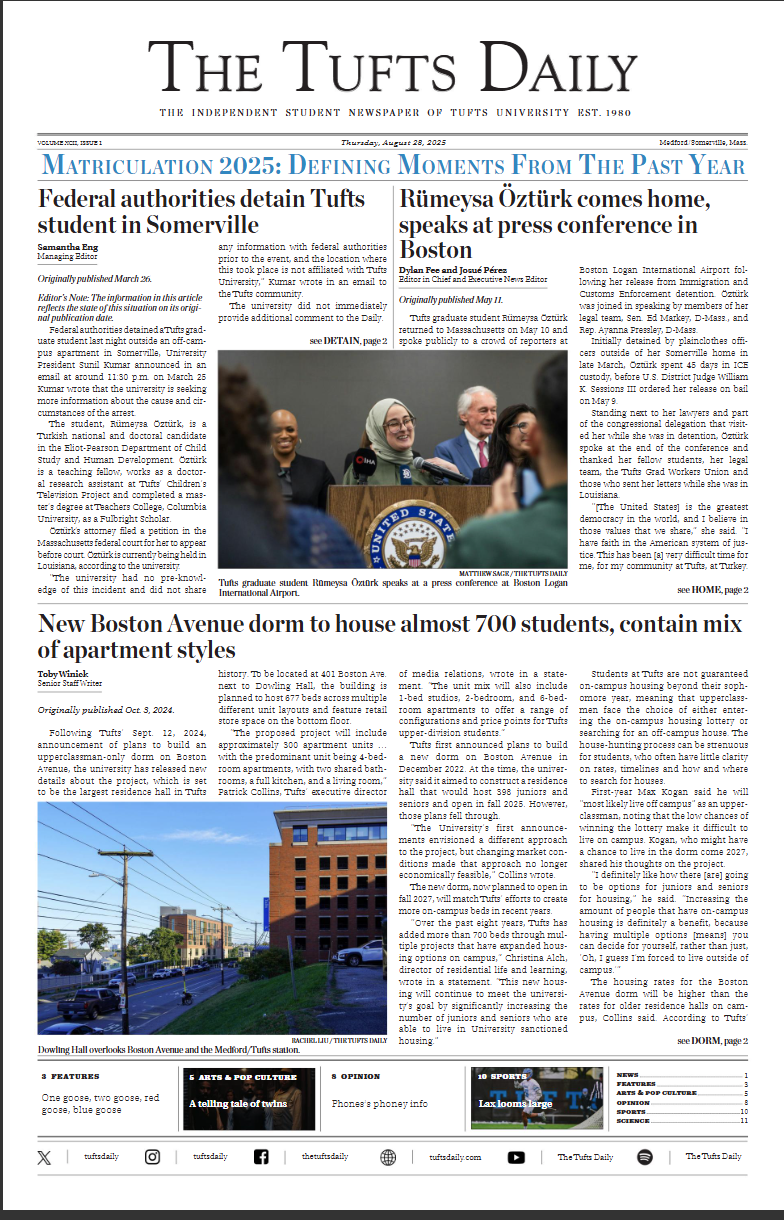A few weeks ago, I returned to Tufts at the invitation of United Leaders, a group that's doing great work trying to get students engaged in public service. I write about national politics for Newsweek, and this fall I'm a fellow at the Kennedy School of Government, so it was fun for me to meet students who were interested in journalism and talk to them about what's going on in the world.
As you might expect, a lot's changed on campus since I spent most of my waking hours at the Observer in the late 1980s. That "Brown and Brew" caf?© in Curtis Hall, for example, used to be our own private, late-night whiffleball court. (Which made more sense, if you ask me: there are a thousand coffee shops in Boston, but there's never a whiffleball court open when you need one.) More noticeable is what's happened to the Observer itself, which recently decided to surrender breaking news to the Daily and relaunch instead as a weekly magazine.
A lot of Observer alums have been talking about this latest development, in a flurry of emails, ever since the Daily published an editorial eulogizing its competitor. One of the sad things about college newspapers is that they have no historians. Their minor glories and controversies are enshrined only in a bunch of dust-caked hardbound volumes that no one ever reads, except maybe to flip through occasionally on a slow news night, making fun of the silly names of the editors who came before. The only hint of the Observer's storied life can be found in its own masthead, in the place where it says: "Tufts Newspaper of Record Since 1895." There are a few things Tufts students really should know about The Observer.
First, despite the Daily's solemn pronouncements, The Observer probably isn't going anywhere, and this isn't even remotely the first time that Tufts' newspaper of record has reinvented itself.
The paper has undergone more or less constant rebirth for at least half a century, long before the Daily existed. Each generation of editors feels the need to adapt the Observer to the needs of the day, and that's the way it ought to be; at various times, "The Big O," as we used to call it, has been a broadsheet and a tabloid, a weekly and a biweekly, an exceptionally good college paper and a remarkably bad one. It has outlasted a century's worth of crusading students and irate administrators, and I expect it will continue to do just that. This doesn't bother me. The Observer has always been a training ground for student journalists, and part of learning is experimenting.
The other thing you should know about the Observer is that it's sent a surprising number of top professional journalists out into the world: editors and reporters at The Boston Globe and The New York Times, CNN and NBC, Newsweek and the Atlantic Monthly. One editor with whom I worked writes a column for a chain of weekly papers; another started a successful journal for sports lawyers.
As much as I love Tufts, it hasn't done much to acknowledge most of these alums or connect them with current students, and this really does bother me. Most of us would gladly come back to campus regularly to encourage students to join the Observer or Daily, or to help the editors of those papers find their way into the news business.
But other than Education for Public Inquiry and International Citizenship (EPIIC) and United Leaders, no one at Tufts shows much interest. I'm told the Communications Department is thriving these days, and several times I've offered my help and volunteered the names of other Observer alums who'd like to keep our tradition alive. I've suggested that the school put together a lecture series or an annual workshop. No one's taken me up on it.
This may be one reason why the Observer finds itself short on support, and why Tufts is now struggling to staff two vibrant newspapers. It's easy for students to follow well-trod paths toward law or business; it's much harder to meet people who can serve as role models in the more rarified world of news.
Thanks to the Observer, and more recently the Daily, Tufts has these resources, but it doesn't tap them. That's a real shame, because there are a lot of Jumbos who would make great reporters, and they ought to benefit from our experiences.
I know there are other Tufts graduates working in politics who feel equally disconnected to life on campus. I hope Tufts' new president will take a more thoughtful approach to alumni relations as a whole, one that make use of our time and expertise. He can start with the Observer alums who owe our careers and our closest friendships to those endless hours spent in Curtis Hall. He doesn't even have to bring back the whiffleball court, although that would be nice.
Matt Bai, LA '90, is a national correspondent for Newsweek, based in Washington, DC.





